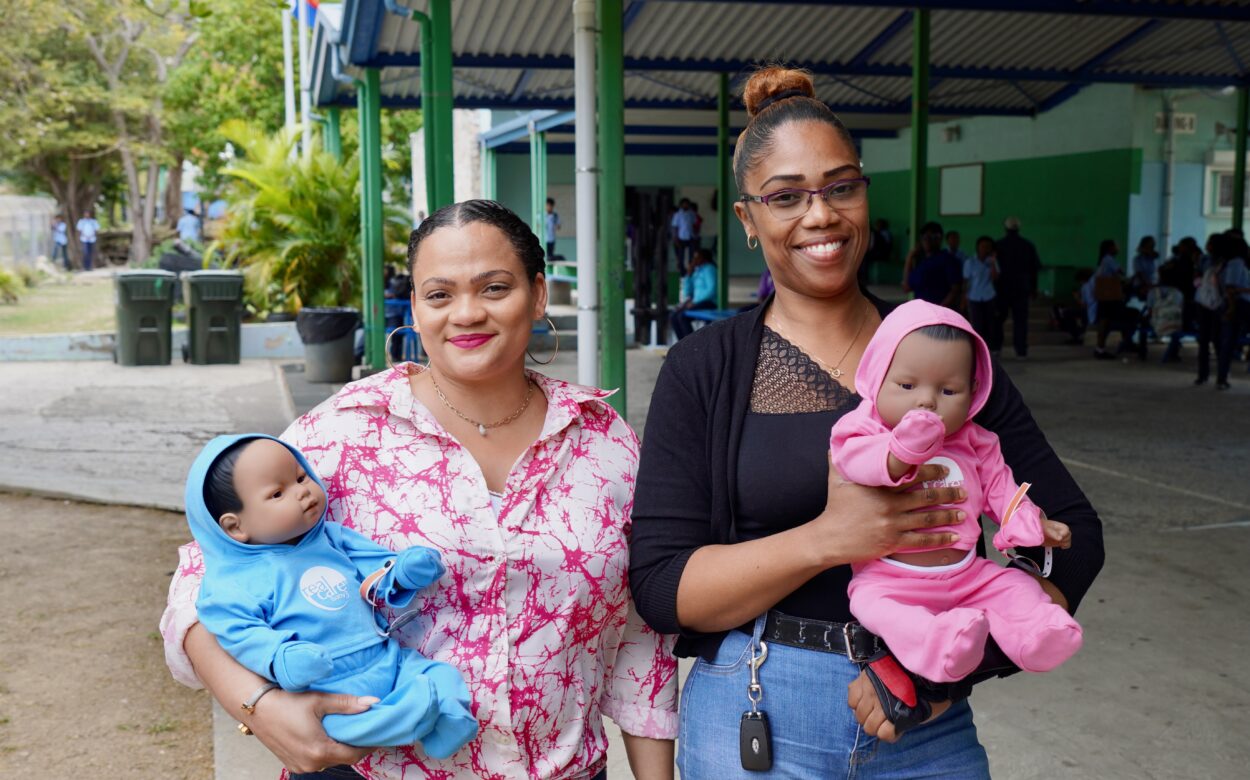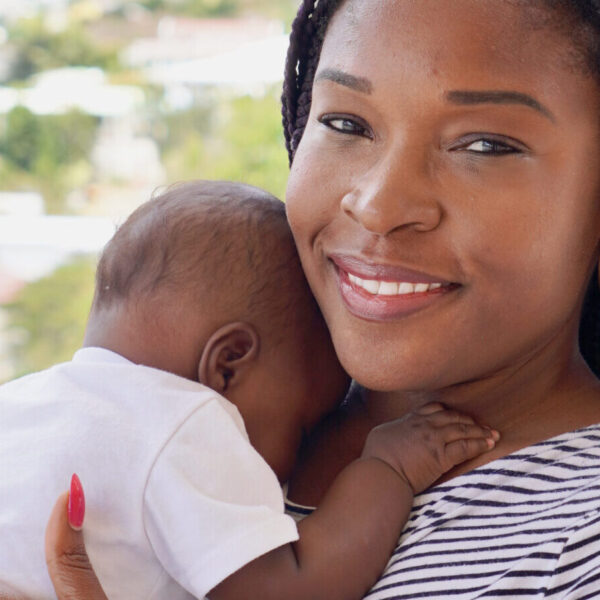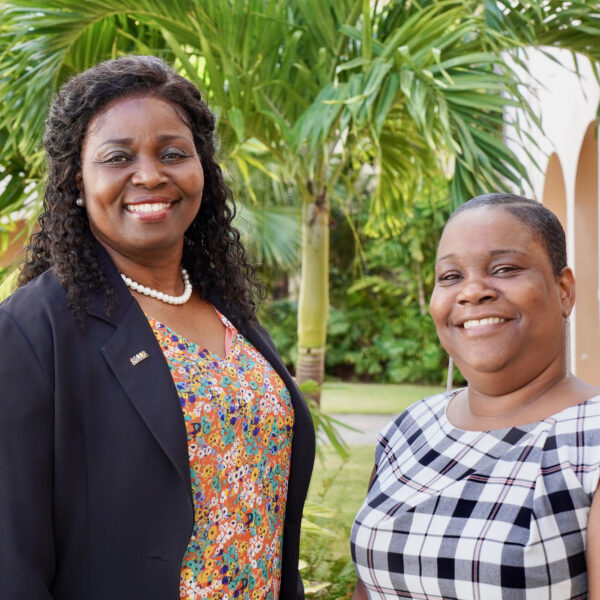Interview with Janique Kolfin-Baly and Milangela Francisca
Milangela Francisca, a social worker, and Janique Kolfin-Baly, an educational psychologist, have been guiding young people for the past 14 years. They are both currently assigned to the Sundial School and Milton Peters College, where they provide support, guidance, and treatment to the students. The two also provide various workshops to the students, including the ‘Baby Think It Over’ programme. The programme is an 8-week programme for 2nd and 3rd-form students which focuses on the prevention of teen pregnancy.
Tell us more about ‘Baby Think it Over’
The programme provides information about body parts, sexual intercourse, and how you get pregnant. Students get to see and feel different contraceptives and a safe space is created for students to openly share and ask questions. There is a discussion on facts and myths about sex and pregnancy. We go into what happens to the body when you are pregnant, per trimester, and how behaviours, such as drinking and drugs, can affect the baby’s development. We talk about miscarriage, abortion, labour, caesarean and natural birth.
“There is a discussion on facts and myths about sex and pregnancy.”
In addition, we also talk about the things a baby needs to be safe and healthy. Other topics addressed are housing, daycare and the financial responsibilities of caring for an infant. The program consists of three practical assignments; one of which our students fill in the “Baby Expense sheet” with prices of baby items at our local supermarkets and baby stores. This allows our students to experience and understand how expensive a baby can be in this present day. Whatever you can think of from start to finish regarding pregnancy and being parents, is in this programme, we discuss it with all our students in an open manner.
The program is closed off with a hands-on practicum with electronic babies. These babies are programmed to track how the students provide care to the baby, based on its needs at that moment. The babies are designed to cry when hungry, need a diaper change, need to burp when the baby is fussy, cold or being mishandled.
What are some of the myths you encounter?
Many things! The most common is you cannot get pregnant if it’s your first time having sex. Another example is you cannot get pregnant if you have sex standing up because the sperm will fall out. Some students believe that the sperm is too weak to go in an upward direction towards the eggs. Another myth that students believe is that you cannot get pregnant while having sex in the ocean because salt water kills sperm.
What are some of the reactions of teenagers to the programme?
There is a lot of curiosity, laughter, and surprised faces. But what is important for us is that they have moments of self-realization: “I don’t want this yet”, or “I cannot take care of a baby yet”. Some of our teens think having a baby is cute or a cure for loneliness, while others believe a baby will strengthen the relationship with their boyfriend and keep him. A few boys think if they have a baby with their girlfriend, she will stay with only him. We encourage our students to wait or practice safe sex. If they don’t want to wait, we express to our students that we are not telling them never to have a baby, but just not yet. An important part of the programme consists of the practicum, as mentioned before. After spending time with these dolls, many students realize what it means to have a baby and to think twice before having a baby.
Despite this programme, there are still teens that get pregnant. Why is this?
With psychoeducation, we have noticed that fewer teens are getting pregnant, and this can be because teens are better informed by programmes such as ‘Baby Think it Over’ and because they talk more openly and can find information online. However, having sex is trendy. Teenagers are also more susceptible to peer pressure. Peer pressure can come from friends, and some might think it’s the only way to ‘keep their boyfriend’. Teen pregnancy can occur from misinformation, peer pressure not to use condoms, thinking that they are using methods such as ‘tracking and pulling out’ right (but are not), or even incorrect use of condoms etc.
How does the school deal with teen pregnancy?
There are three ways we usually find out that one of our students is pregnant. Most of the time, they come in for advice or to talk about it, sometimes, the parents will approach us first, and otherwise, it can be that others around the teen share the news with us and we then approach the student.
We start by understanding the circumstances and discussing with the student her options and what she would like to do. If the parents do not know about the pregnancy yet, we encourage her to tell her parents. Together with her network, we make a care plan which includes keeping the student on her educational track as much as possible so that she can graduate.
These must be difficult conversations. How do parents react?
Initially, often with disappointment and concern for their child’s future. Sometimes parents react in shock and remain silent, while others cry or get angry. However, these are all natural reactions and parents need time to process the information they have just received. We do offer support to the parents at that moment and guidance on the way forward. We often know the family situation of our students, so if we think that the father or mother might react negatively, we can choose to tell them separately first. After the initial shock, most families will provide their support. In cases where the student does not have a strong network, this greatly increases the challenges during teen pregnancy.
“If you feel like you can act like a big woman, get outta the house”
Sometimes, parents do not want anything to do with the pregnancy “If you feel like you can act like a big woman, get outta the house” and kick their child out of their home. We then report the case to the Court of Guardianship who will do research to assess who can provide a home and support within their network of the student. In most cases, we notice that families reconcile and reunite after some time or once the baby is born.
What about the father? How is he involved?
The burden most often falls on the teen mother and her parents. Most of the time when the teen mom is a minor her parents become the guardian of the child. The parent(s) of the teen mom is then responsible for this baby. Sometimes we are unaware of the identity of the father.
In cases where we do know who the father is, we involve his parents as well and see what agreements can be made. In most cases, the ‘father’ either attends another school or is already out of school.
What are some of the ramifications of teen pregnancy for the (teen) mother?
Teen moms can experience social isolation, especially emotionally, where their peers can reject, ignore, or exclude them. Academically, they might miss school as it becomes much harder to follow classes towards the end of pregnancy or when they have lots of symptoms during their pregnancy.
Conflicts or challenges can arise between families depending on the involvement of the father, or the lack thereof. Financial worries become greater for the parents of the teen mom and sometimes even for the pregnant teen herself. Some teen moms go through depression and other mental health issues due to these challenges and having to grow up quickly and the sudden lifestyle changes.
We should also consider that abortion is currently illegal on the Dutch side and the ramifications of this. If a student wants to abort, they go to the French side, which is often not covered by insurance.
How can this affect the child born from a teen mother?
Depending on the teenager and her environment, there can be a higher chance of neglect or abuse. Teenagers are more emotional and can lack patience and get quickly angered. If the teenager doesn’t take up their responsibility, it can be that the baby is left with their parents or grandparents. Statistics show that children of teenage mothers also are more likely to become teen mothers themselves. During ‘Baby Think It Over’, we emphasize the importance of never leaving a child alone with someone you don’t trust.
“If the teenager doesn’t take up their responsibility, it can be that the baby is left with their parents or grandparents”
This topic also opens discussions about our students’ safety and predators. We have too many men who seek out young girls. These men often enjoy that the power dynamic is in their favour. Not all teenagers are confident enough to say: no! When they are approached or touched without permission. We try to instil this confidence in them. In addition, our school has a good relationship with the community police, so we call them if we see or hear of suspicious activity.
What needs to be put in place so we can better support or prepare teens to make more responsible decisions regarding sex?
Starting education on sexual health topics in high school is too late. Often misconceptions have already been formed. Age-appropriate sexual health programs should be implemented in all primary schools. Parents should also open this discussion at home. This helps students to receive information instead of myths about sexual health or pregnancy. It is however understandable that some parents may feel uncomfortable discussing such topics or lack up–to–date information on these topics. Parents can always seek information on sexual health in books and/or by consulting with their house doctor. Information can also be collected at the Department of Collective Prevention Services. Some information is also available online, but parents need to be mindful of the credibility of the source it came from.
“Parents can always seek information on sexual health in books and/or by consulting with their house doctor.”
Also, there needs to be more financial support for (teen) mothers. Social welfare is not always an option, and a student may not qualify. And if the student does qualify the amount might not be what they expect to fully care for themselves and their baby. In some cases, social welfare may not be accessible if the student (or their family) is not legally registered. The latter also means that the student might not be SZV insured. Unfortunately, sometimes the only financial or material support teenaged mothers can count on is from our teachers and occasional donations from individuals or Non-Governmental Organisations.



